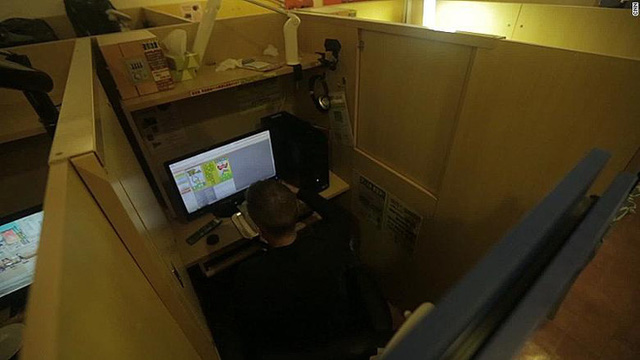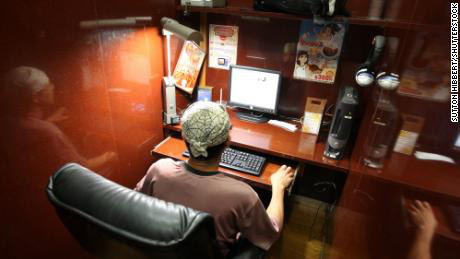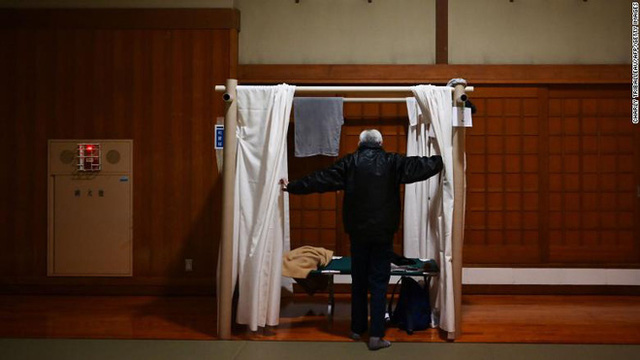Those who were “knocked out” by Covid-19 from their final home: Japan’s cruel exposition of a dark corner
- Tram Ho
“Many companies have gone bankrupt due to the pandemic. There are many people who are currently losing their jobs like me,” said Takahashi, 35, from Tokyo, who is waiting in line in Shinjuku to get a free meal from Moyai homeless support organization.
Takahashi slept at a bus stop in Tokyo for more than two weeks when internet cafes closed due to a blockade. He is just one of 4,000 homeless people living in internet cafes open 24/7 in Tokyo.

Picture a room in an internet cafe
In the past weeks, the number of Covid-19 infections in Japan has increased sharply. As of the morning of May 4, according to Worldometers’ statistics, the country had 14,877 virus infections and 487 deaths.
To prevent the spread of the new corona virus (SARS-Cov-2), the Japanese government has declared a state of medical emergency nationwide, ordering the closure of businesses, including cafes. internet access, forcing those who live here to seek other refuge.
The above emergency situation has been extended to the end of May 31.
Japanese officials have provided emergency accommodation to support homeless people currently residing in internet cafes. However, the pandemic exposed decades-long issues in Japanese society.

A man in a private room at an internet cafe (photo: CNN)
Internet Café and outstanding issues
Although Tokyo is known as a rich, high-tech city, it also has a community of 5,126 homeless people, according to data released in 2019 by the local government.
Of these, 4,000 refugees are living in internet cafes and the other 1,000 are unemployed and living under bridges, cardboard boxes and tents in parks or along the banks. river. Charities believe the actual number could be much higher.
Tom Gill, a social anthropologist at Meiji Gakuin University, said: “People started using [internet cafes] to replace hotels, because the cost of renting internet cafe accommodation was cheaper. Since then, this place has gradually turned into an extremely strange shelter for the homeless. ”
Due to being open around the clock, many internet cafes and manga and video cafes all across Japan offer baths, laundries, coffee shops, and most importantly, private rooms with reclining chairs, with You can rent hourly by day or stay overnight. The private rooms are separated by thin wood.
The rent for private rooms varies from place to place. However, the price of a room rented for 12 hours will range from USD 17 to USD 19 on weekdays and about USD 28 on holidays or weekends.
In Tokyo there are so many internet cafes that anyone can find a place to sleep on almost all nights.
In the past decade, due to partial legalization of temporary and part-time jobs in 1986 and total legalization in 1999, the number of part-time workers in Japan has increased sharply.
According to the Ministry of Internal Affairs and Communications of Japan, Japan has 22 million part-time and contract employees in 2019. This figure in 2011 was 17 million.
Some of them do not have a daily job and are usually paid a minimum wage of 9 USD / hour. Such workers are difficult to own a permanent house. In Japan, renters need to pay rent to the landlord at least three months in advance.
As many as 15,000 people stay in internet cafes every night in Tokyo. A lot of them are people who stay after work and miss the last train home. The remaining are those who cannot afford to pay for housing.
Takahashi is not afraid when internet cafes are crowded. He rented a private room with a key, and also packed all his belongings in a backpack so he could easily move from place to place.
But things have changed since the pandemic struck.
His company went bankrupt, internet cafes were also closed due to blockades.

A shelter provided by Kanagawa prefecture for those who used to stay at internet cafes (Image: CNN)
A very different type of homelessness
The type of refugees in cafes that have existed since the 1990s, but people won’t mind it when the economy is stable, because these homeless people are, in fact, not sleeping under the road – Mr. Gill said.
However, the Covid-19 pandemic “cruelly exposed things that were hidden in the Japanese economy,” he added.
On April 30, Tokyo government spokesman Hatanaka Kazuo said the city would provide homeless people in these internet cafes a room in the hotel until May 6. This deadline may be extended based on a national emergency.
To qualify, applicants need to present a membership card of internet cafe or bring a receipt proving that they used to live in this place. Each area in Tokyo will have an information desk to assist refugees at internet cafes.
Before April 21, these refugees must prove that they have been in Tokyo for 6 months. As of April 22, these supports have been removed.
Since the announcement of a state of emergency in Tokyo on April 7, nearly 700 people have moved into hotels supported by local authorities. In Yokohama, south of Tokyo, the leaders transformed a martial arts room into a residence designed for private spaces, with curtains to create a sense of privacy and also to enforce the rules of spacing. society.

Accommodation provided by Kanagawa Prefecture
Many refugees at internet cafes did not know the help because Tokyo officials did not spread the word, said Ren Onishi, president of Moyai.
In early April, Moyai issued a petition asking for permission to use the athletes’ villages for the Olympics held in Tokyo next year in order to turn them into homeless shelters. The petition has so far garnered 53,000 signatures.
The homeless in Japan are often blamed for their status, Mr. Onishi said. He hopes that, through the pandemic, this will be changed.
Social stigma towards homeless people has made many people extremely embarrassed to seek help. Internet cafes give them the most basic accommodation and are anonymous. They only need to answer a few questions then pay the cost in cash.
“Anonymity is an advantage, especially when you don’t want your family or colleagues to know where you are,” says expert Tom Gill.
According to him, the large number of people living in internet cafes are men due to conservative attitudes in Japan. Men who look healthy often are blamed for leaving themselves homeless. Japanese officials seem to sympathize more for women.
Source : Genk
